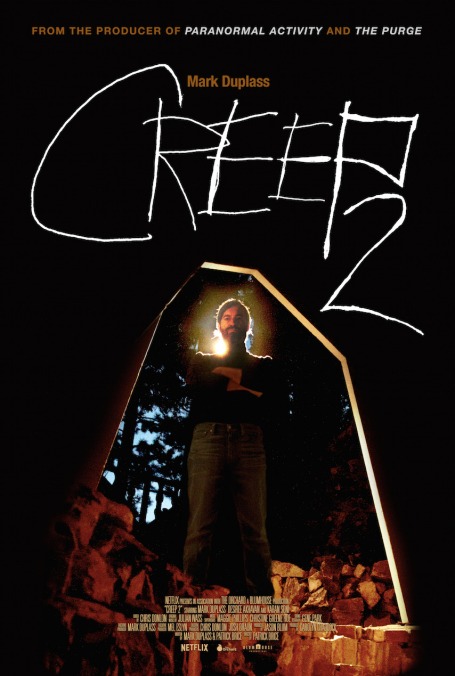The first big improvement is Duplass’ co-star, Desiree Akhavan, primarily known for writing, directing, and starring in Appropriate Behavior. In Creep, Brice played the curious documentarian who agrees to film a day in the life of Josef (Duplass), a mysterious man who turned out to be a killer. As an actor, Brice made a good director, to put it diplomatically. His lack of onscreen presence gave Duplass’ charismatic weirdo little to play off of—a real problem in a two-hander. For the sequel, the two wisely turned over the role of the new curious documentarian to Akhavan, a strong screen presence who immediately enlivens the proceedings with her portrayal of Sara, a woman making a reality webseries about unusual Craigslist requests and the people who make them. Unfortunately, no one’s watching, and she’s convinced her work sucks. Desperate for a good story, she drives out to film a man who calls himself Aaron (Duplass), and that bold determination justifies her decision to stick around through increasingly bizarre situations.
That good story is the second place Creep 2 surpasses its progenitor. While the slow reveal of Duplass’ murderous tendencies was the source of Creep’s tension, the entire narrative was gradually revealed to be little more than a hunter toying with its prey, sprinkled with a dash of emotional philosophizing. Here, Aaron is frank about everything upfront: He tells Sara he’s a serial killer, but he’s lost the taste for it and doesn’t know what to do. Instead of his usual movie-making routine, which ends with him killing his victim, he wants her to film the real him, and he promises not to kill her for 24 hours so she can complete the story of his life. Despite his enthusiasm for the project, he quickly grows frustrated when even his simple plans for filming don’t work out; soon, Sara is taking charge of the day (and their relationship), and Aaron is growing increasingly impressed with his new collaborator.
Blunt honesty allows for a much more fascinating exploration of desire and emotional manipulation, because we can actually believe Aaron when he talks. It lends dramatic stakes to what was previously all smoke and mirrors, and the new relationship is actually engaging, especially as Sara repeatedly surprises him with her moxie. (“Whoa, tough nut to crack,” he says admiringly after she fails to be startled when he jumps out of nowhere and screams in her face.) By the time a late-in-the-film twist readjusts the parameters of their interactions, enough has been exchanged between them to keep momentum going through the climax. The discussions are more involved, the character work richer and subtler. Even the diegetic camerawork contributes more to the film’s interest in how gender can change perspective: When both characters take turns getting naked for the camera, she keeps the shot still on his entire naked body, whereas when Sara strips, Aaron progressively zooms in on her face to avoid capturing her nudity.
As in the first film, the ending leaves a little to be desired. But Brice and Duplass have nonetheless concocted a new chapter to this tale that strengthens and illuminates its warped narrative, smartly playing to the top of the audience’s intelligence. Also, it’s quite funny. (In his Craigslist ad for a documentarian, Aaron says, “Fans of Interview With The Vampire a plus.”) Given a performer who can match him in talent, Duplass has transformed his twisted killer into a flawed and charismatic soul, radiating a quiet desperation that’s far more magnetic this time around. He’s made a monster more intriguing upon a second installment. Not many film series can make that claim.









































